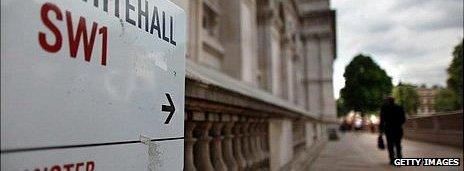Whitehall's worries about Freedom of Information case
- Published

Could publishing a Whitehall document outlining the possible risks of the NHS shake-up pose a risk to good governance? That's been the argument made in an appeal against a Freedom of Information ruling in central London this week.
The typical British civil servant is keen to keep ministers' confidence and stay out of the political fray.
So should they be entitled to "safe space", away from the heat of political debate to provide frank advice - or should the public interest in controversial government programmes take precedence?
The government of the day tends to argue the former. In this case the coalition has refused to publish officials' risk assessments of its controversial NHS overhaul for England.
Risk registers are not usually published. They were described as giving officials the opportunity to "think the unthinkable", unbalanced papers that focused more on what might go wrong - however unlikely - rather than what might go right.
They have a "traffic light" system to flag up the likelihood and impact of risks, the two day information tribunal heard.
'Very conflicted'
They are meant for officials' eyes only. But the possibility that they might be seen by the wider public, is ringing alarm bells in Whitehall.
Their argument is that the risk registers would not enhance public debate - but would inevitably be politicised, lead to "argument by soundbite" and damage to "good governance".
Una O'Brien, the top civil servant at the Department of Health, said she believed in transparency and a well informed public debate - but didn't see why that meant debate should be "informed by confidential advice given to ministers in the process of policy formulation".
Most of the FOI requests that the DoH received were granted, she said but in this case she feared publishing two "risk registers" about the NHS overhaul could undermine the important relationship between ministers and civil servants. Officials would then be "distracted" into having to respond to the ensuing anxiety - as they would be "sensationalised".
Whereas now officials felt free to spell out, in the bluntest terms, every problem that might hit a project, in future they might hold back, for fear of embarrassing ministers, and the quality of advice would be undermined.
'Very worried'
She said she had already spoken to many civil servants who were now "deeply concerned that they will feel very conflicted in future" about raising legitimate concerns.
"It takes time to build a culture where people can feel confident in being open and that culture can be very rapidly and dramatically broken. Civil servants are human beings, not machines."
She argued she was acting in "the wider public interest": "The taxpayer expects good public administration."
She was backed by the man who, until recently, has been the UK's most senior civil servant - Lord O'Donnell. The former cabinet secretary said concerns went further than just the officials giving the information. "The internal audit people I have talked to are very, very worried," he said. "They feel it would damage the quality of work that has been done."
The Act itself had already had "quite a big impact" on officials and ministers. He pointed out that, during Lib-Dem/Tory talks before the formation of the coalition, there had been a discussion about whether a meeting would "be FOI-able" if a civil servant was present, taking notes.
And while the effect of previous rulings was still "hard to know", people were "a lot more cautious". He was worried that conversations about risk might then go into the realm of "unrecorded space" - chats on sofas and mobile phones - rather than through the official process, resulting in "wrong policy".
'Covering posteriors'
Should the government lose the case, the nature of risk registers would change, he predicted.
Ministers would start to ask for them to include the risks of "doing nothing" and perhaps of the policies of other parties, rather than "focusing ministers' minds on the really important things they need to do to make a success of their reforms".
"Dare I say it? Quite a lot of what you'd see in them is very useful for pushing the risk somewhere else - covering posteriors."

Lord O'Donnell was concerned about that publishing risk registers would have a big impact
But are they over-playing the threat? What Whitehall chiefs see as a "distraction" for civil servants, others consider an informed public debate.
Need civil servants fear that this case would open the floodgates on risk registers? No, said the information commissioner - who argues that this case is exceptional because of the size and speed of the changes being pushed through - and the public debate about the risks, at a time of much financial pressure on the NHS.
The government says many of the risks outlined in the secret papers were published - in impact assessments, external of the bill.
Labour say concerns have been raised by everyone from the Commons health committee to the independent King's Fund think tank and point out that elements of the impact assessments had been judged "not fit for purpose" by the independent regulatory policy committee.
'Unprecedented' concern
In those situations - should people, and Parliament, have to rely on information put out by the government, which by its nature is supporting the need for reform?
Labour MP John Healey, who requested that the risk register be released when he was shadow health secretary, has experience from the other side of the debate in batting back FOI requests.
As a minister in the Labour government, he unsuccessfully fought attempts to stop "Gateway reviews" of the controversial ID card scheme from being published.
But he argued this case was exceptional. The parliamentary interest in the risks was "unprecedented" in his 15 years as an MP - something he put down to being "a product of poor policy making", so the public interest in publishing how the government had assessed risks "massively outweighs the case for non-disclosure".
The speed of the reforms - a White Paper was published two months after the 2010 election - meant they were inherently more risky and suggested that in future years the bill could become a case study in how not to legislate, he said.
He did not dispute the need for "safe space" for officials, in the early stages of policy development - but by the time his request was made, in November 2010, he says the NHS policy was clearly quite advanced. Two months later the legislation was introduced in the Commons.
And he points out that civil servants are obliged to carry out risk assessments - they are not an optional extra.
He said he would want to avoid damaging the risk analysis process but told the tribunal: "The question for me is: Would that happen?.. in my experience as a minister, it probably wouldn't."
The government has several options for refusing FOI requests - cabinet papers are covered by the 30-year rule - soon to be cut to 20 years, and other exemptions are open to them. In this case they used the "section 35" defence - for papers relating to policy formulation, but it has to be weighed against the public interest.
The information commissioner says it is not a case that all risk registers should be published - but in this case the public interest in disclosure was "very strong". The scale of the changes was illustrated by a quote from NHS chief executive David Nicholson that they were "so big, they can be seen from space".
The tribunal has now ruled that the transitional risk register requested by Labour should be published - the Department of Health says it will "work with colleagues across government and decide next steps". It can appeal again.
Meanwhile the Health and Social Care Bill, which introduces the NHS overhaul in England, is due to complete its Parliamentary stages within weeks.
If it is published, it may come too late to influence the bill but will it have a lasting impact on the way risk assessments are worded?
- Published7 March 2012
- Published5 March 2012
- Published1 March 2013